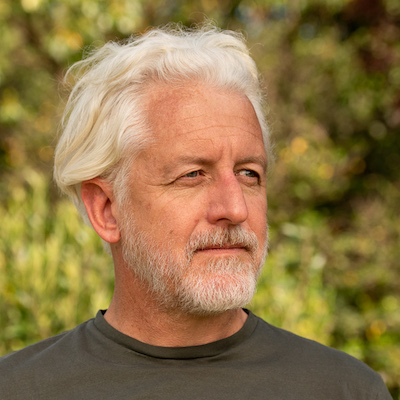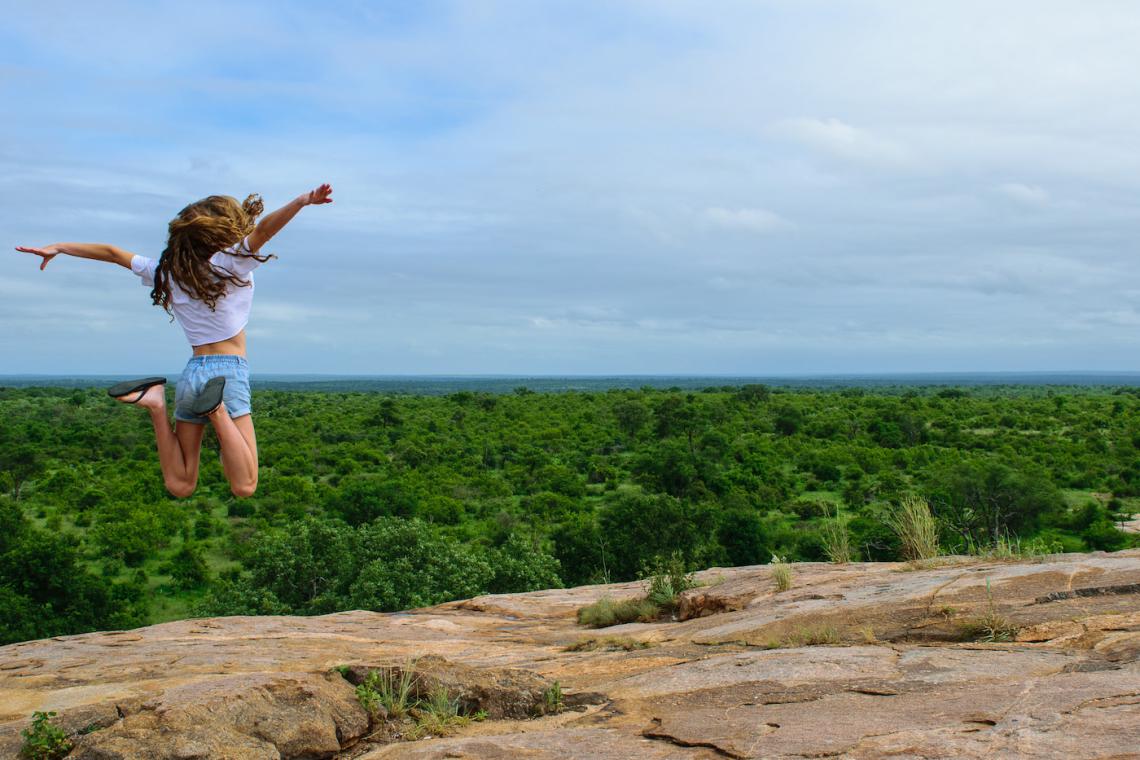Morning breaks, the morning call of the Cape turtle dove says, ‘Work harder, work harder’, reminds you that working is for other people; today, at least, you are on holiday. You are on safari in the Kruger National Park, South Africa’s majestic wildlife jewel, spanning an area about the size of Israel. On your agenda: get up early, drive through untouched Africa, find that leopard, and dodge that elephant. But first, coffee, of course, you are addicted; you even brought your plunger (french press) to ensure it’s just right. Using the self-catering rondavel’s (African-style hut) kettle, you prepare your flask for the morning drive.
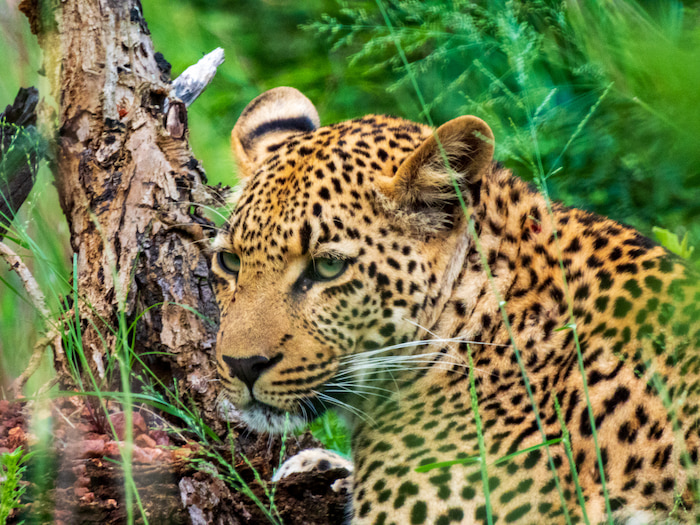
Leopard up close and personal with Nikon P950
As the camp gate opens at dawn, eager tourists armed with cameras, binoculars or, like me, the superzoom Nikon P950, keen as you are to capture that perfect National Geographic-worthy wildlife shot, await the gate to open. As you start the drive, you muse that, at Kruger Park, the humans have to stay in the zoo at night while the animals roam free. Sipping on your coffee, hunting for that first sighting, you see another car parked ahead. What are they looking at? You cannot see. Ah, the car has a birdwatcher warning: ‘We stop for birds’, better check the trees. There it is, you see it, it’s a European roller. You already have quite a few roller pictures and decide to move on. You have to find that leopard. Today, too, will undoubtedly yield some fantastic photo evidence, if not for National Geographic, then at least for Instagram. And so the day starts.

Ground Hornbill - Vulnerable - Visitors are requested to report their sightings
For many South Africans staying in the inland regions, going to the Kruger National Park on holiday is just one of those things you do every year. We most certainly do not call it self-drive or any such formal descriptions. Many South Africans pack their car and go to the Kruger, often with little forethought and concern. I, however, realised for many foreigners, it must be pretty daunting to get in the car and drive to this wild, untamed wilderness through a country you do not know, especially in a country where you have to take safety precautions.
I decided to give you a detailed guide that can help. Please let me know if you found this article helpful; it keeps me going. If you are reading this guide to find out about the Kruger National Park but prefer an organised safari, I can suggest BookAllSafaris or Viator to find a Kruger safari that suits your wallet and travel preferences.

Hippo & bird at the river
Planning Your Kruger Park Adventure
What is a good time of the year to visit the Kruger Park?
Every season has its advantages and disadvantages in the Kruger National, and the accommodation in the Southern part of the park is typically booked up the entire year, especially during the local December holidays. However, locals will usually tell you winter is a time to visit the Kruger National Park—the slightly cooler temperatures in an otherwise very hot climate. The reduced grass cover improves sightings. Many locals would go to Kruger during winter holidays and to the beaches of Cape Town or Durban Kwa Zulu Natal in the summer. As a tourist, you may want to combine beach and bush. In this case, the park is fantastic all year round.
Here are Some Advantages and Disadvantages by Season:
Summer (December-February): Hottest time of year, with lush vegetation and full waterholes. Good for birdwatching and seeing newborn animals.
Autumn (March-May): Pleasant temperatures, less rain and clearer skies. It is suitable for game viewing as animals gather around waterholes.
Winter (June-August): Dry season with cool mornings and warm afternoons. Sparse vegetation makes spotting animals easier.
Spring (September-November): Wildflowers bloom, and temperatures become warmer. It is suitable for seeing calves and baby animals.
Map: Paul Kruger Gate - Kruger National Park
What Accommodation Options Are available?
Staying inside or outside the park in public or Private Accommodation, the Kruger National Park is a global attraction and offers a massive selection of accommodation options. SANPARKS manages the main camps in the Kruger National Park. You can book your accommodation through their website or on booking.com. Although many tourists may take a chance in the off-season to drive through the Kruger and look for camps with accommodation, planning your accommodation well ahead of time is advisable. The most popular camps are usually fully booked well ahead of time.

Hyena with cubs
There is also a range of accommodation options in the park that are private concessions. These often focus on luxury experiences. Surrounding the park, you can find private reserves such as Sabi Sands and Timbavati, often with no fences to the Kruger National Park. Also, outside the park, you will find various accommodation options that provide day tours into the Kruger National Park, providing the advantage of access if accommodation is full. Some places also offer budget accommodation, such as backpackers’ lodges.
Camping and Glamping
Most of the camps in Kruger National Park have campsites. These campsites are well equipped with electricity, communal kitchen huts, showers, and ablution facilities. The campsites can be booked through the SANParks website. If you prefer the comforts of home that formal accommodation provides with the African feel of a tent, Kruger National Park provides 'Glamping' options by SANParks and private concessions. Glamping is a fusion of "glamorous" and "camping," offering a luxurious outdoor experience with the comfort of modern amenities. It combines the adventure of camping with upscale accommodations, providing a unique and stylish way to connect with nature.

Endangered African wild dog
Vehicle Rental Options:
Choosing the right vehicle is paramount before you embark on your Kruger adventure. You can opt to go for a standard rental vehicle. Even the most budget-friendly car will do the trick. I enjoyed one of the most memorable trips ever using just such a rental car. The only downside is the vehicle's height; tall grass sometimes causes an issue, and you may need to get creative to view some popular animals restricted by the massive number of 4x4 vehicles South Africans love to drive. Traffic situations happen mainly in the Southern Areas close to Skukuza.
If the perfect view is your objective, consider renting a higher vehicle, such as a 4x4 or minibus. You can also consider the motorhome or RV experience, which offers some real advantages in terms of height and amenities.
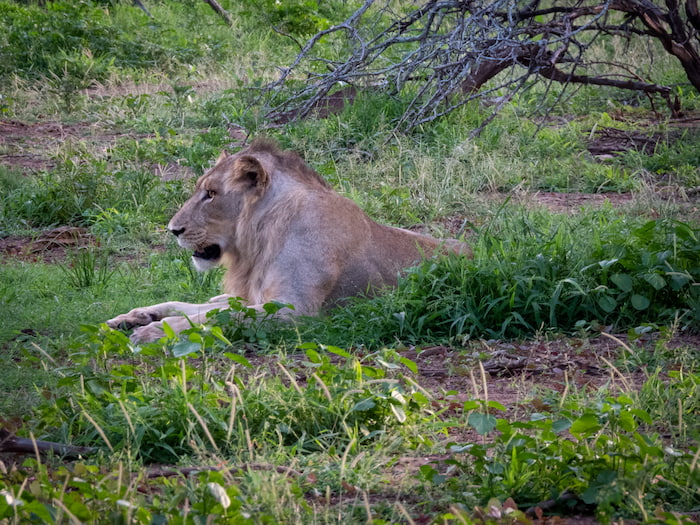
Lions often cause traffic situations in Southern Park
Booking a Rental Car:
South Africa has a vast fleet of rental cars, 4x4s, and minibuses from most international providers. Streamline your journey by using platforms like Rentalcars.com to book your vehicle.
RV Vehicle Essentials:
The elevated windows of RVs offer panoramic views, putting you in the front row for every wildlife spectacle. Having toilet facilities on the vehicle proves to be handy as you cannot get out of the car in most of the Kruger Park, only in designated picnic spots, viewpoints and camps. Check with your provider on the amenities offered with the vehicle. Opt for affordability by renting through Motorhomerepublic.com. Maui Motorhome and Britz are popular options in the country.

Female violet backed starling at her nest
Malaria and Health Considerations
Consult with a doctor regarding malaria risks, particularly in the northern areas during the wet summer. The Southern Parts of the park around Skukuza are generally accepted as safe from Malaria. But you may want to take malaria preventative tablets. The camps have basic medical assistance options, but keep in mind the closest hospitals are a substantial drive away, so keep your adventure risks to a minimum.
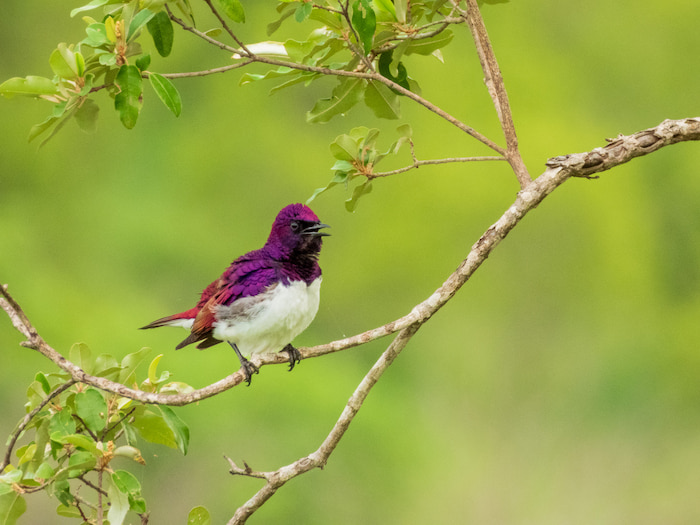
The male making sure we hear that we are intruding
Kruger National Park Safari Packing List:
Essentials:
• Comfortable clothing: Lightweight, breathable shirts and pants for hot weather, long sleeves and warmer layers for cooler mornings and evenings. Quick-drying fabrics are ideal. (Many international tourists prefer complete safari outfits, but most South Africans will enjoy the park with comfortable everyday outfits)
• Hat and sunglasses: Protect yourself from the sun's harsh rays.
• Sunscreen and insect repellent: Choose effective options for the African climate.
• Binoculars: Essential for spotting wildlife during game drives.
• Personal toiletries and medications: Don't forget essentials like medications and personal hygiene products.
• Camera and charging equipment: Capture your Kruger memories!
• Torch (flashlight): Useful for early morning starts and night exploration.
• First-aid kit: Be prepared for minor cuts and scrapes.
• Reusable water bottle: Stay hydrated throughout the day.
• Comfortable walking shoes: Opt for sturdy shoes with good grip for uneven terrain.
• Book or travel journal: Keep yourself entertained and capture your experiences.
Optional extras:
• Safari bag or backpack: Easy to carry essentials during game drives.
• Swimsuit and towel: Take a dip in the camp pool if available.
• Adapter plug: Ensure you can charge your electronics.
• Snacks and drinks: Bring some non-perishable snacks for the road.
• Cash: Some smaller shops and markets may not accept cards.
• Guidebook or wildlife ID app: Enhance your wildlife spotting expertise.
Arriving in South Africa
When you land in South Africa at Johannesburg International Airport (O.R. Tambo International Airport)
It is advisable to stay at least the night in Johannesburg. When you arrive in South Africa, you may be tired, and the drive may be unsafe. Only attempt to drive on the day you land if you arrive very early. If you are staying inside the Kruger National Park, consider the gate closing times, which differ in summer and winter.
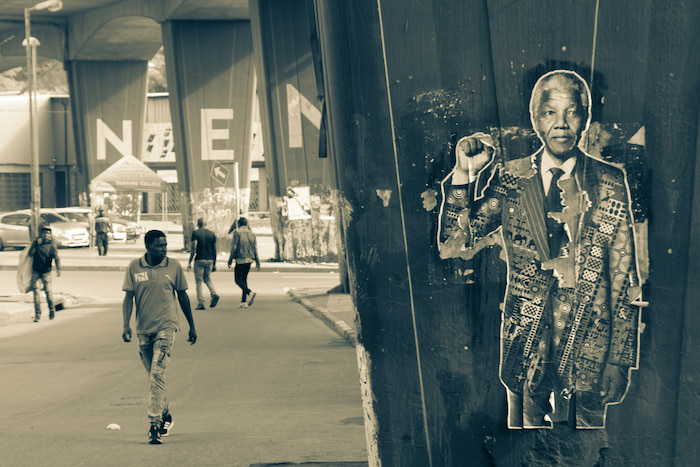
Nelson Mandela Poster Johannesburg - Gregory Fullard
Your One night in Jozi, the City of Gold
I suggest the Sandton area for this specific type of journey. The Sandton City area provides a range of hotel options close to a central shopping district. If you decide to stay longer than one night, ask your hotel what local tours are available. Popular tours include the Apartheid Museum, Nelson Mandela’s home and Soweto.
One of the main advantages of doing your safari in South Africa is that you have all the modern comforts at home, and they can assist you on your safari. The mix of first-world and wilderness is genuinely unique. You can use your favourite app to book your car and RVs and use your map applications to navigate (Inside the park, phone reception is mainly restricted to the parks). Your map application should still work. You can use booking.com to book your accommodation.
Driving to the Kruger National Park
How to get to Kruger National Park from Johannesburg Airport (O.R. Tambo International Airport)
The quickest route to Kruger Park from Johannesburg is 392 km via the N12 and N4. Driving to Kruger Park from Johannesburg International Airport takes about 4-5 hours without stopping along the way. Driving from Johannesburg to Kruger in perfect conditions should take 5-6 hours. The route has excellent rest stops. Milly's is the most famous, and about halfway on the N4 route; give it a try.
Driving from Johannesburg to Kruger is perfectly safe, although you should watch out for construction, toll booths, speed traps, and potholes. Navigating the roads leading to Kruger requires awareness of road conditions and toll fees. Overseas cards may not work at toll areas, so you must be prepared for toll fees in cash during your journey to avoid embarrassment (It is a real problem I witnessed). To be safe, do not divert from well-traveled routes, city roads, or directions by your favourite map application unless you check in with a reliable source.
I have warned you about the gate-closing times already ;) They still catch out the South Africans. Leave enough time to navigate inside the park to the camp. Remember, speed restrictions inside the park is 50km per hour. If you place the camp as a destination, your maps application should consider this for the arrival time.
Map: Malelane Gate - Kruger National Park
At Which Gate Should You Enter the Park?
Your choice of the gate is very personal and dependent on the camp or accommodation options you choose. But here are some suggestions. The main gate, probably the most popular, is the Paul Kruger Gate. It provides access to the biggest camp, Skukuza. The drive to the gate may be slightly challenging yet fascinating as you must navigate some relatively rural areas. The quickest and most direct gate to enter the park I found is the Malelane gate. It provides access to the Berg-en-Dal rest camp and is not too far from Skukuza.
The Kruger National Park gate opening and closing times vary depending on the season:
November to January:
Entrance Gates Open: 5:30 AM
Camp Gates Open: 4:30 AM
All Gates Close: 6:30 PM
February to March and October:
Entrance Gates Open: 5:30 AM
Camp Gates Open: 5:30 AM
All Gates Close: 6:00 PM
April to September:
Entrance Gates Open: 6:00 AM
Camp Gates Open: 6:00 AM
All Gates Close: 6:00 PM
These are the general times, and specific gate times may vary slightly. Always double-check with SANParks
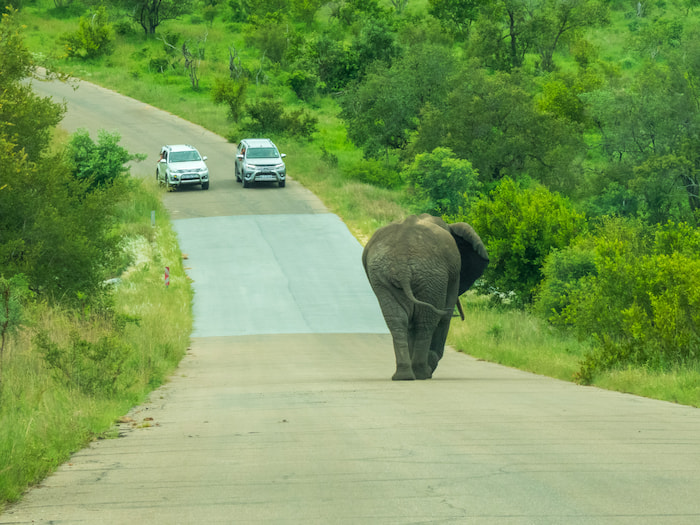
Elephants can be unpredictable stay at a distance
Inside the Kruger National Park
Park Rules for Your Safety:
Familiarise yourself with camp and gate opening/closing times. Adhere to the 50km/h speed limit, ensuring a safe and enjoyable journey between camps. Do not leave your vehicle outside the designated camp, picnic or viewing areas. Stick to main routes, keep vehicles locked, and save emergency numbers from the rental company. Adhere to safety guidelines, especially during elephant encounters, you should keep your distance. Elephants often clearly indicate with their behaviour if your presence is disturbing. Move away promptly or risk being the villain of a viral video starring a vehicle elephant encounter with a squashed car.

Giraffe always a favourite up close with the Nikon P950
What Animals Are You Likely to Encounter at the Kruger on your Safari?
Kruger National Park is one of the most popular tourist destinations in South Africa because of the fantastic range of wildlife in their natural habitat. It is located in the northeastern part of the country and is home to various wildlife. The diverse range of wildlife includes the Big Five - lions, leopards, elephants, rhinos, and buffalos. Other animals you will likely encounter include cheetahs, giraffes, zebras, hyenas, hippos, crocodiles, and many more. There are over 150 mammal species in Kruger National Park, ranging from the very large (elephants) to tiny shrews. The park is also home to a wide variety of bird species, with over 500 species recorded.
To guide you through the incredible diversity of wildlife, I suggest taking along a comprehensive guidebook; my absolute favourite is Game Ranger in Your Backpack: All-in-One Interpretative Guide to the Lowveld.
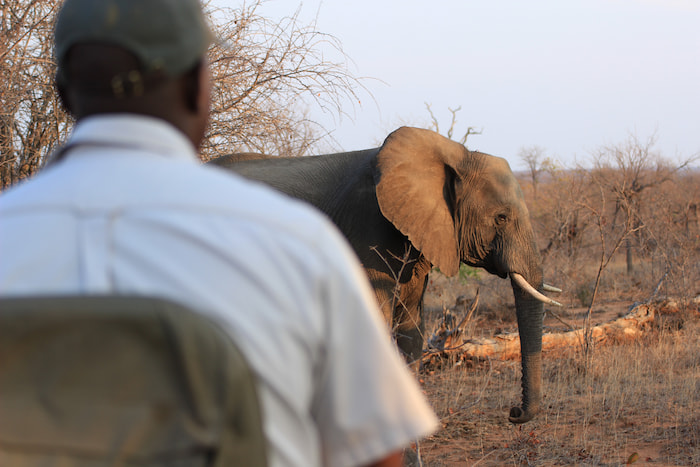
Kruger National Park Game Drive
Kruger National Park Activities: A Wildlife Playground!
Kruger National Park offers a treasure trove of activities you can join and book at the various camps. Here are just some examples.
Wildlife Encounters:
• Game drives: Embark on thrilling morning or afternoon drives in open vehicles, guided by experienced rangers who expertly navigate the terrain and unveil the park's hidden wonders.
• Bush walks: Immerse yourself in the heart of the wilderness on guided walks, traversing diverse landscapes, and you may encounter a mating lion or a buffalo staredown (a personal experience).
• Night drives: Embark on a thrilling adventure into the nocturnal realm of Kruger. Spot creatures of the night, like lions stalking their prey, owls hunting rodents, and the mesmerising glow of fireflies illuminating the darkness.
You can book your game drive at the camp or find a private activity at GetYourGuide.
Rest and Relaxation:
• Picnic at rest camps: Pack a delicious picnic and head to designated picnic spots within the park, overlooking scenic landscapes.
• Swimming pools: Take a refreshing dip at rest camps, especially during the hot afternoon hours.
Family Fun:
• Junior Ranger programs: Let your little ones embark on exciting educational adventures with ranger-led activities and games. Learn about animal tracks, conservation efforts, and protecting nature.
• Bush braais (BBQs): Enjoy a traditional South African braai under the starry sky at designated areas within rest camps.
Beyond the Safari:
• Cultural experiences: Visit nearby villages and communities to learn about the region's rich cultural heritage. Engage with local craftspeople, taste traditional cuisine, and gain deeper insights into the life and traditions of the people who share this landscape.

Bateleur Couple Kruger National
Shops, Restaurants and Amenities in the Kruger National Park
Most camps in Kruger Park have a camp shop. These stores, managed by National Parks, provide most of the necessities you will require for self-catering or camping holidays. Skukuza's store has the most extensive selection. The store's offerings include African memorabilia and everyday necessities such as bread, milk, coffee, cool drinks, and snacks. The shops stock some often left behind camping equipment and, most important to South Africans, braai wood, ice, liquor and meat for the evening's braai. If you left something behind, don't worry; you will most likely find it right there in the camp.
If you prefer eating in a restaurant, you will find each camp's restaurant selection has its flavour and style, offering breakfasts, simple lunches, and a la carte menus.
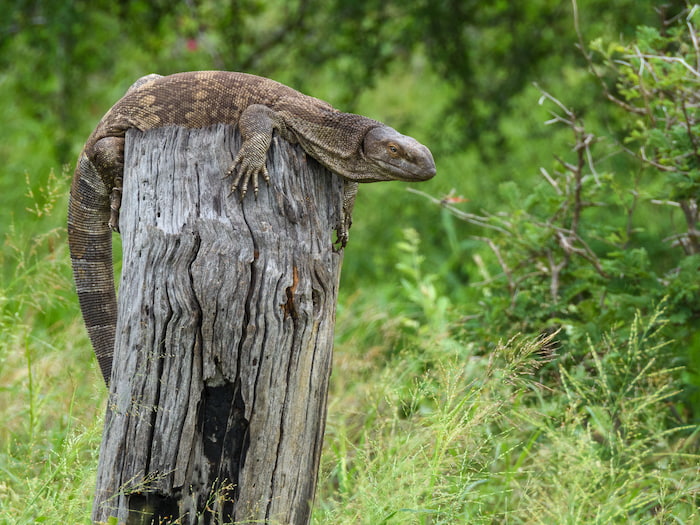
Rock Monitor Kruger National
Inside the Kruger Park, our Journey Continues
That Leopard has been avoiding you every day. You checked yesterday’s sightings on the community pinboard at the camp and followed their general direction, but no leopard. Fortunately, your previous forays racked up sightings of four of the big five: a lion, elephant, buffalo and that endangered rhino guarded by some well-armed rangers.
The well-marked, stone-built road sign indicates ‘Tshokwane’ 10km. Just in time, you are starting to feel like breakfast. On arrival, you notice the well-prepared, most probably local, tourists cooking their breakfast on gas cookers provided by the camp. The English menu prompts you to order a local favourite, roosterkoek (literally translated as grill cake), grilled on the braai (South Africa’s version of the barbeque) right there. While you enjoy your meal under the typical African savannah tree, you ponder your place in this vast natural ecosystem. And, of course, lunch at one of the more formal camp restaurants, such as Satara, as one does when time is of little consequence.
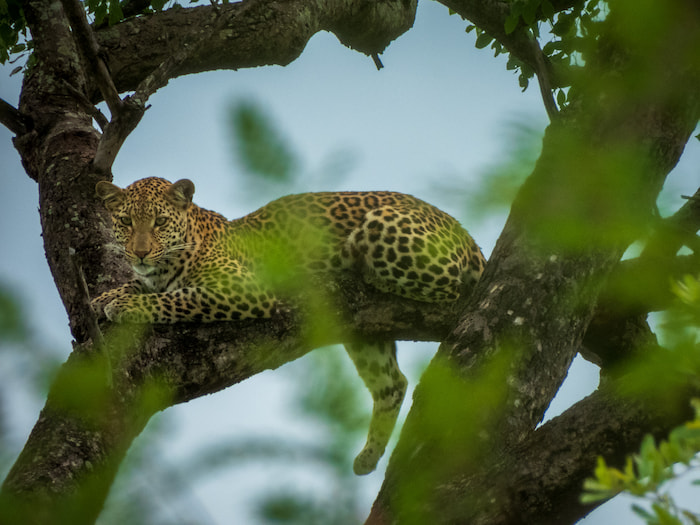
The closing time of Skukuza’s gate tonight, at six pm, is the only distant reminder of the African clock’s drumbeat that will welcome you back to the human zoo. Tonight, the only escape back into nature will be booking an evening game drive with the camp. You consider the idea; it may afford you the opportunity to find that nocturnal leopard, viewing it from the open game drive safari vehicle. The local guide may even have the inside track on some of the latest sightings. Enough planning for now; ‘tomorrow is another day’, as the locals would say. You decide to hit the road, but first, ‘Americano to go please’, lekker.
The Kruger National Park, with its unrivalled biodiversity, beckons explorers. It's a realm where nature dictates the rhythm, and each moment is a brushstroke on the canvas of an unforgettable self-drive safari. But where to from here?
Beyond Kruger: Exploring Cape Town and More
Cape Town Extension:
If time allows, extend your journey to Cape Town. Explore iconic attractions and venture to the Stellenbosch wine region for a unique tasting experience.
